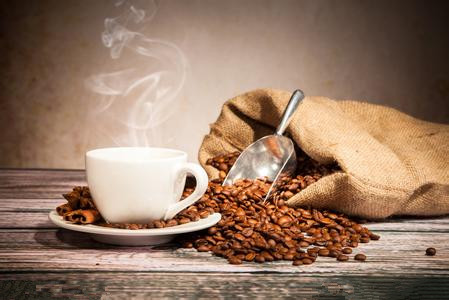The efficacy and harm of Coffee

Benefits:
1. Coffee contains certain nutrients. Nicotinic acid in coffee contains vitamin B, which is higher in roasted coffee beans. And there are free fatty acids, caffeine, tannic acid and so on.
two。 Coffee is good for the skin. Coffee can promote metabolic function, activate digestive organs, and has a great effect on constipation. Taking a bath with coffee powder is a kind of thermotherapy, which has the effect of losing weight.
3. Coffee has the function of relieving alcohol. Drinking coffee after drinking alcohol will quickly oxidize the acetaldehyde converted from alcohol, decompose it into water and carbon dioxide and discharge it out of the body.
4. Coffee can relieve fatigue. In order to eliminate fatigue, we must supplement nutrition, rest and sleep, and promote metabolic functions, and coffee has these functions.
5. Three cups of coffee a day can prevent gallstones. For caffeinated coffee, it stimulates gallbladder contraction and reduces cholesterol, which is prone to gallstones. The latest Harvard University researchers found that men who drank two to three cups of coffee a day were less than 40% likely to get gallstones.
6. Drinking coffee regularly can prevent radiation damage. Radiation damage, especially the radiation of electrical appliances, has become a prominent pollution at present. Indian Barba atomic researchers have come to this conclusion in mouse experiments and say it can be applied to humans.
7. The health care and medical function of coffee. Coffee has the functions of anti-oxidation and heart protection, strengthening muscles and bones, benefiting waist and knees, appetizer, eliminating fat and accumulation, promoting orifice and dehumidification, promoting blood circulation and removing blood stasis, relieving wind and relieving spasm and so on.
8. The influence of coffee on mood. Experiments show that the average person absorbs 300 milligrams of caffeine (about 3 cups of brewed coffee) a day, which has a good effect on a person's alertness and mood.
Disadvantages:
1. Caffeine contributes to confusion when you are nervous. Caffeine helps to improve alertness, agility, memory and concentration. But drinking more coffee than you are used to will produce the same dose of stimulants that you are used to, which can cause nervousness. For people with anxiety disorders, caffeine can worsen symptoms such as sweaty palms, palpitations and tinnitus.
two。 Exacerbate high blood pressure. Caffeine is often combined with other simple painkillers because of its analgesic effect, but if you take it in large quantities for a long time, if you already have high blood pressure, using a lot of caffeine will only make your situation worse. Because caffeine alone can raise blood pressure, coupled with emotional stress, it can have a dangerous multiplication effect, so people at risk of high blood pressure should especially avoid drinking caffeinated drinks during stressful times at work. Some people who drink coffee all the year round think they are immune to the effects of caffeine, but this is not the case. One study shows that blood pressure can rise for up to 12 hours after drinking a cup of coffee.
3. Induce osteoporosis. Caffeine itself has a good diuretic effect, if you drink a lot of coffee for a long time, it is easy to cause bone loss, which will adversely affect the preservation of bone mass and may increase the threat of osteoporosis for women. But the premise is that people who don't get enough calcium in normal food, or people who don't move very often, plus women after menopause, calcium loss caused by lack of estrogen, coupled with a large amount of caffeine, may pose a threat to bones. If you can enjoy it in a reasonable amount, you can still stop eating for fear of choking.
The following six types of people are not suitable for drinking coffee:
Suffering from high blood pressure, coronary heart disease, arteriosclerosis and other diseases-long-term or heavy consumption of coffee can cause cardiovascular disease.
Older women-Coffee reduces calcium and causes osteoporosis. After menopause, women need to add ten times the amount of calcium every day.
People with stomach problems-drinking too much coffee can worsen stomach problems.
Pregnant women-drinking too much coffee can lead to fetal malformation or miscarriage.
People with vitamin B1 deficiency-vitamin B1 can maintain the balance and stability of the nervous system, and coffee has a destructive effect on it.
Cancer patients-drinking too much coffee is at risk of cancer to normal people.
Study on the composition of coffee:
Caffeine: caffeine is the most eye-catching of all the ingredients in coffee. It belongs to a kind of phytoxanthine (animal muscle component). It has the same properties as theophylline contained in cocoa, green tea contains the same theophylline, and the percentage of reduction after baking is very small. Caffeine has a very extensive effect. It will affect various parts of the human brain, heart, blood vessels, gastrointestinal tract, muscles and kidneys. The right amount of caffeine will stimulate the cerebral cortex, promote sensory judgment, memory and emotional activity, and make the myocardial machinery more active. Vasodilation enhances blood circulation and improves metabolic function. Caffeine can also reduce muscle fatigue and promote digestive juice secretion. In addition to this, because it also promotes the kidney function to help the body expel excess sodium ions (chemicals that hinder the metabolism of water molecules), caffeine will not accumulate in the body like other narcotic and excitant substances (narcotic drugs, paint solvents, stimulants, etc.) and will be excreted in about two hours. The bitterness, the most important feature of coffee flavor, is caused by caffeine.
Tannic acid: after extraction, tannic acid will turn into a yellowish powder, which can easily blend into water. After boiling, it will decompose and produce pyrosylic acid, which will make the coffee taste worse. If you brew it well and put it for several hours, the color of the coffee will become stronger than when it is just right. And it is also less tasty, so there is the saying that "it is best to drink it as soon as possible."
Fat: the fat contained in coffee plays a very important role in flavor. After analysis, it is found that there are many kinds of fat in coffee, the most important of which are acidic fat and volatile fat. Acidic fat refers to the presence of acid in fat. Its strength varies with different types of coffee, and volatile fat is the main source of coffee aroma. Once the fat in roasted coffee beans comes into contact with the air, it will change chemically and the taste will get worse.
Protein: the main source of calorie is protein, and like dripping coffee, most of the protein will not dissolve, so no matter how much coffee you drink, the nutrition you get is limited, which is why coffee will become a dieter.
Sugar: without sugar, you will not only feel the bitterness of caffeine and the sour taste of tannin, but also feel sweet, which is caused by the sugar contained in the coffee itself. After baking, most of the sugar will be converted to caramel, giving the coffee a unique brown.
Minerals: there are lime, iron, sulfur, sodium carbonate, phosphorus, chlorine, silicon and so on, because the proportion of very little affect the flavor of coffee is not big, combined to bring only a little astringent taste.
Crude fiber: raw bean fiber will be carbonized after baking, this carbon and sugar caramelization combine with each other to form the tone of coffee, but the fiber turned into powder will have a considerable impact on the flavor of coffee. Therefore, we do not encourage you to buy powdered coffee beans because you are unable to taste the flavor of the coffee.
Important Notice :
前街咖啡 FrontStreet Coffee has moved to new addredd:
FrontStreet Coffee Address: 315,Donghua East Road,GuangZhou
Tel:020 38364473
- Prev

Healthy eating habits add coffee to milk
1. Eat multivitamin after breakfast. Studies have shown that supplementation of suitable multivitamins is of great benefit to your health. So why eat after breakfast? On the one hand, it can provide what the human body needs for a day, so that you have the energy to devote yourself to work and study, and on the other hand, it will not cause too much burden on the kidneys. 2. Drink two glasses of water before each meal. This will keep the body in water all the time.
- Next

Coffee Black Coffee Best Diet Coffee Drinks
As a member of OL, you should not be unfamiliar with coffee culture, right? 30 minutes to 1 hour after lunch, enjoy a strong cup of coffee without sugar and partner to help digestion after meals and promote fat burning. Before work, drink another cup of coffee and go for a walk. Coffee slimming tips do not add sugar: if you are not used to the bitter taste of coffee, you can add a little milk, but thousands
Related
- Beginners will see the "Coffee pull flower" guide!
- What is the difference between ice blog purified milk and ordinary milk coffee?
- Why is the Philippines the largest producer of crops in Liberia?
- For coffee extraction, should the fine powder be retained?
- How does extracted espresso fill pressed powder? How much strength does it take to press the powder?
- How to make jasmine cold extract coffee? Is the jasmine + latte good?
- Will this little toy really make the coffee taste better? How does Lily Drip affect coffee extraction?
- Will the action of slapping the filter cup also affect coffee extraction?
- What's the difference between powder-to-water ratio and powder-to-liquid ratio?
- What is the Ethiopian local species? What does it have to do with Heirloom native species?

